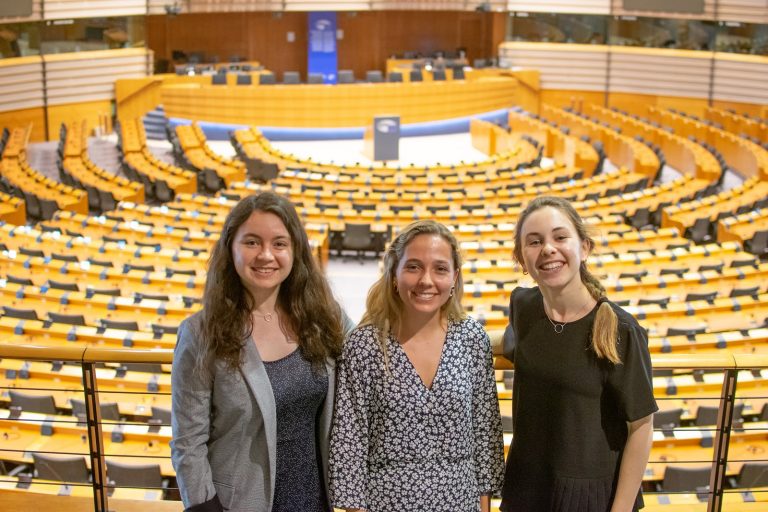
Martin Schulz, former leader of the EU Parliament group “Socialists and Democrats” (S&D), once said that “for many people, politics in Brussels and Strasbourg might as well be happening on another planet.” Indeed, there are those who feel that these two cities are isolated from the rest. However, we, as European students, feel that this is not the case. In the weeks we have spent in this capital city, we had the opportunity to learn about European Politics and to follow the decision-making process up close. As part of our internship at JESC, we have had the privilege to meet important figures within the EU sphere and, most recently, to visit the Brussels Hemicycle of the EU Parliament, which has allowed us to experience european-ness at its best.
Our backgrounds in international politics and languages allowed us to appreciate the finer details of the institution. Prior theoretical knowledge came to life around us as we entered the hemicycle, as did possible future careers working at the EU. Upon seeing the interpretation booths, for example, it was easier for us to comprehend that each Member State of the Union has a voice representing its citizens, honouring the EU motto “unity in diversity”. By providing translations of everything that happens in the hemicycle in all the official languages of the Union, the events that take place in Brussels can be brought closer to all Europeans. Furthermore, it allows for the strengthening of the notion of European belonging and community at the national, local and regional level. Citizens are not only being represented by a democratically elected candidate, but by the use of and interpretation into their mother language.
It was especially interesting for us to visit a European institution at a time when discussions regarding the candidates for the top EU positions were taking place, mostly in Brussels itself. At the time of our visit, no agreement had been reached regarding the candidates for the top jobs of the Union, but now we know that two of the five positions will likely be occupied by women for the first time. This allowed us to further appreciate the weight of some of the challenges that the Union is facing. Since the 1990s, for example, the EU has pursued the objective of promoting the balanced participation of women and men in decision-making at local, regional and national levels as part of its broader commitment to gender equality. Today, this reality is closer than ever.
These past decades the Union has been facing issues that require an enhanced collaboration of the Member States and a better understanding of the european identity to fulfill the EU’s potential. Having young individuals of the continent taking part in the activities of the Brussel bubble is a step towards democratic development. Our visit to the European Parliament has allowed us to appreciate how far the Union has come in this sense. According to Javier Solana, it started as a peace project among adversaries and managed to spread stability across the continent. Now, the Union is on its way to become a global power, a force for good in the world, and we hope to contribute to this process.
Loreto Machés Blázquez, Blanca Marabini San Martín, and Emilie Noël
JESC Summer Interns 2019

